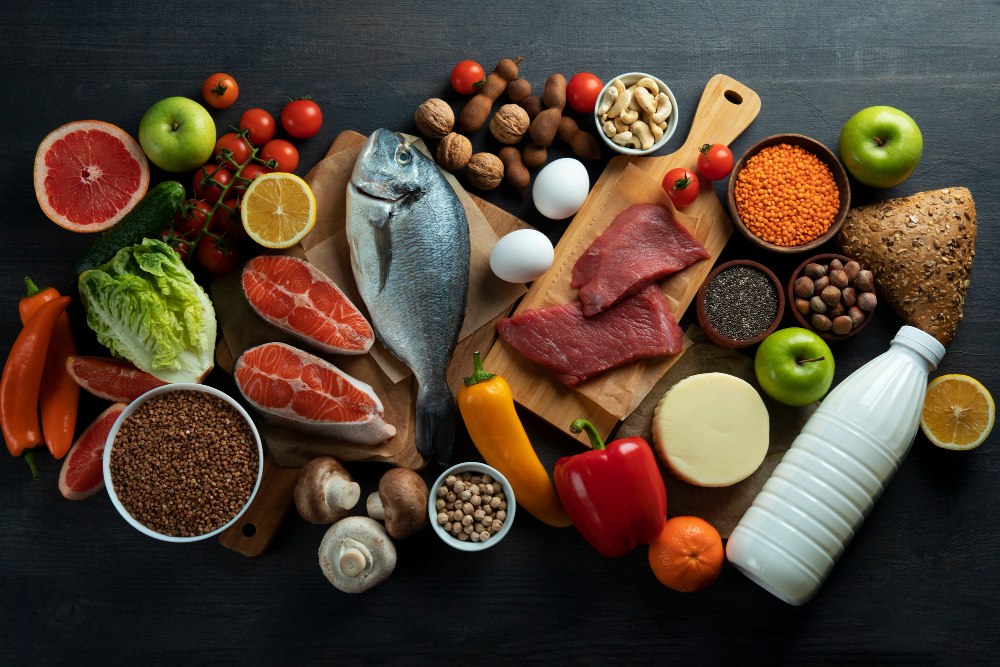
[adinserter block=”3″]
In our body, proteins are the building blocks for the amino acid. Proteins are a large category of molecules that will support the most basic functions like immune functions, hormone synthesis, chemical reactions, and body movement. Nine amino acids are essential for the body; protein produces this amino acid. Healthy sources of protein consumption is also helpful in weight loss. According to RDA, 0.36 grams of protein is required per pound of your body weight.
Getting the optimum amount of protein in your diet is essential for overall health. Many healthy protein sources include red meat, fish, eggs, dairy products, etc. Dig deep into protein-rich foods, benefits, side effects, and protein consumption.
Benefits of Protein
Protein consumption has many health benefits, like weight loss, and increased muscle strength, and many other benefits. According to a study by Oxford University, a rich protein diet has the predominant effect on weight loss and metabolic reactions in the body. Here are
-
Reduce appetite: Protein consumption has the predominant effect on weight loss as it reduces the appetite And The Hunger level of the body. If you need to lose weight or Belly fat, you must start consuming protein instead of Carbs and fats.
-
Increase bone health: There are many myths that animal protein is bad for your health. But these are myths you don’t need to believe in. People who consume more protein than fat will maintain bone density and have a much lower fracture risk.
-
Reduce cravings and late-night snacking: wing is very hard to control, but the best way to control the cravings and late-night snacking is to consume more proteins which will make you full overnight.
-
Boost Metabolism: the protein will help to boost the metabolism and increase the fat-burning process. As the metabolism and the fat-burning process are boosted, you will automatically start using fat.
-
Lowers blood pressure: now what is, high blood pressure is the major cause of strokes or heart diseases. According to a study, protein consumption not only helps lower blood pressure but also helps in reducing LDL or bad cholesterol.
Vegan Sources of Protein
Healthy sources of protein for vegans or vegetarians have a long list, including beans, lentils, tofu, quinoa, nuts, seeds, and plant-based protein alternatives, providing diverse options to meet nutritional needs. Here are the healthiest foods that are rich in protein:
1. Legumes
Legumes, including beans, lentils, and sprouts, are the best plant-based source of protein. Legumes are the natural and the best source of protein. Legumes are not only abundant in proteins but also rich in fibers. The combination of protein and fibers provides a sustained release of energy from the body. The best source of protein is the overnight-soaked moong sprouts.
2. Chickpeas
Chickpeas are high sources of protein other than meat, particularly for individuals following vegetarian sources of protein or a vegan diet. They fulfill your protein intake and provide essential nutrients like fiber, vitamins, and minerals, promoting overall health and supporting digestive well-being. Including chickpeas in your diet can contribute to meeting your protein needs while offering other nutritional benefits. If you have digestive issues, try not to eat chickpeas before bedtime, as they can cause discomfort or bloating, affecting your sleep quality.
3. Dairy products
Dairy products include milk, yogurt, and cheese, the most valuable protein sources and other essential nutrients. Dairy products are also a very good source of calcium, which takes care of bone health. You must include dairy products in your daily life if you are looking to increase your protein intake. It is important to consider individual dietary preferences because many people are lactose intolerant. People cannot take the daily products to a protein-rich diet.
4. Nuts and seeds
Nuts and seeds include peanuts, Chia seeds, almonds, and Pumpkin seeds; these foods are densely rich in protein. These are the most healthy snacks containing essential healthy fats and protein. You can add many varieties of seeds into your diet to provide a diverse range of nutrients, including protein, healthy fat, vitamins, and Minerals. It is important to consider the quantity you consume because it is advisable to include high quantities of seeds or nuts.
5. Tofu
Tofu is an excellent source of plant protein. Tofu is a unique plant-based protein containing all nine amino acids. Tofu is a protein powerhouse and a good source of other essential nutrients like Iron, calcium, magnesium, and Vitamin B. Tofu is a plant paste so it will be an ideal choice for vegetarians or Vegas. As it is a plant-based protein, it is easy to digest.
6. Protein powder
Protein powder is one of the most popular or convenient food sources of protein, which is commonly used by our generation nowadays. Protein powder is the most convenient method to prepare and drink the shake. Many protein powders in the market are sourced from whey, soy, pea, rice, or hemp. Protein is essential for muscle building or muscle repair. This is why protein powders are the best choice for bodybuilders or athletes.
7. Peanut and peanut butter
Peanut butter is an excellent protein source that offers numerous other essential nutrients. It is a plant-based protein that contains about 25% of protein by weight, making it valuable to add to a balanced diet. For the optimum protein source, you can consume two tablespoons of protein butter daily, nearly equal to 7 to 8 grams of protein. You will also get vitamin E, magnesium, phosphorus, niacin, and protein in the peanut butter. You should opt for salty peanut butter instead of the sweet one.
8. Jowar (Sorghum)
Jowar, also known as sorghum, is a nutritious grain with moderate protein, making it a beneficial addition to a balanced diet. You can include this in your weight loss plan for zero carbs, as it also provides essential amino acids. Beyond protein, Jowar is rich in fiber, aiding digestion and promoting a feeling of fullness. It is gluten-free, making it suitable for those with gluten sensitivities. Jowar is a good source of vitamins and minerals like B vitamins, magnesium, and Iron. Due to its nutritional profile, consuming Jowar may help regulate blood sugar levels and support heart health.
9. Edamame
Edamame is a great source of plant-based protein, offering all essential amino acids. The food is Rich in vitamins and minerals and provides folate, vitamin K, and Iron. Its high fiber content supports gut health and helps with weight management. Additionally, edamame contains antioxidants, such as isoflavones, which may contribute to heart health and reduce the risk of certain chronic diseases. You can cook various dishes or add them to salads to maximize the benefits.
10. Soybean
Soybean is a plant-based source of protein that offers a wide range of health benefits. Soybean is rich in protein, with approximately 36% of their total calories coming from protein, which makes them a valuable food to add to in diet. So, you are a good source of other nutrients, including fibers, vitamins, and minerals. Soybean contains unsaturated fat, including Omega 3 fatty acid, contributing to your health by reducing cholesterol levels.
11. Broccoli
Broccoli is not a particularly high source of protein as compared to meat or other dairy products, but it just contains protein and another essential nutrient. On average, a cup of cooked broccoli contains about 3 grams of protein. Along with the protein-rich, it is also rich in vitamins and minerals, including vitamins C, K, A, magnesium, and potassium. Broccoli is a very low-calorie food, which makes it a great choice to include in your diet. Broccoli is fiber-rich, making you feel full and supporting your digestive health.
12. Oats
Oats are a nutritious whole grain that provides various health benefits, but they are not particularly a source of protein. Along with protein, they contain many other essential nutrients. Oats contain protein; an average of one cup of cooked oats contains 6 grams. Along with protein, it is rich in carbohydrates, particularly beta-glucans, and has many benefits for cardiovascular health.
Non- Vegan Sources of Protein
Non-vegan sources of protein include:
1. Eggs
Typically, people starting at the gym prefer eating eggs, but are eggs a good source of protein? When it comes to protein-rich food, the first thing that comes to mind is eggs. Whole egg is a protein, antioxidant, vitamin, minerals, and carbohydrate source. The yolk of the egg does not contain protein as it contains other nutrients, and the white part of the egg is pure protein. One whole egg provides nearly 6.3 grams of protein, making it the best protein source. Also, eggs are considered the cheapest sources of protein as they come at an affordable price.
2. Beef
Beef is a widely consumed or high-quality protein serving protein to the body. Beef is a particularly dense source of protein. The protein content can vary depending on the cutting and preparation method of the beef. Beef is also an excellent source of Iron, which is highly bioavailable and easily absorbed by the body. Along with Iron, it is also a good source of zinc, vitamins, and other minerals. Beef contains saturated fat, so you should not consume much beef.
3. Chicken breast
Chicken breast is the best protein source to increase your protein intake. Chicken breast is rich in protein, vitamin B, and Minerals like zinc and sodium. Chicken is a very versatile and widely consumed lean meat. To all the parts of the chicken, the breast has an ample amount of protein.
4. Fish
Fish is also one of the best sources of proteins for the nonvegetarians. Fish is a complete protein source as it contains all the nine amino acids essential for the body. Fish also contains omega-3 fatty acids, which have many helpful benefits, including cardiovascular health, brain function, and reducing inflammation. Vitamin D, vitamin B12, and other minerals like iodine. You can get numerous choices and types of fish, which allows you to vary your protein sources.
5. Pork
Pork is a meat that many people eat around the world. It contains protein, vitamins, and minerals that help our bodies grow. This makes it a high source of protein food which is a good choice for a healthy diet. Pork has different fats but also has all the important building blocks called amino acids that our bodies need. Meat, like pork, is one of the best protein sources. So, if you exercise a lot, like bodybuilders or athletes getting better after injuries, eating pork or other meats can be good for you.
6. Turkey
The food consumed for the taste is also a good source of high-quality protein, containing essential amino acids crucial for body growth and maintenance. Turkey is relatively lean meat, providing important vitamins and minerals, including B vitamins, Iron, zinc, and phosphorus. While it does contain some fats, particularly in the skin, opting for lean cuts can minimize fat intake. The amino acids in turkey contribute to muscle repair and overall body function. Studies suggest that incorporating lean meats like turkey into a balanced diet can support muscle health, making it beneficial for individuals involved in physical activities or recovering from injuries.
What Are The Potential Side Effects of Protein?
When you eat an optimum amount of protein, there are no side effects, but if you consume a large amount of protein, it will create discomfort and other digestive side effects. These Side Effects include:
-
Weight gain: we have heard that eating a lot of protein will help you lose weight, but this method is very short-term.
-
Bad Breath: Eating too much protein will cause bad breath, especially when you cut out carbohydrates.
-
Constipation: according to a study, around 44% of consumers of protein experience constipation as a side effect. Increasing your water and fiber intake.
-
Kidney damage: consuming high sources of protein in excessive amounts can lead to kidney damage in healthy individuals.
-
Calcium loss: a diet rich or high in protein can cause calcium loss. This calcium loss may be associated with osteoporosis and poor bone health.
Conclusion
To stay healthy, eating different foods with lots of protein is important. Proteins are like building blocks for our bodies, helping them work well and stay strong. Different kinds of foods give us good sources of protein. Some come from animals, like meats, fish, eggs, and milk. Others come from plants, like beans, nuts, seeds, and soy products. Nuts and seeds have protein and healthy fats that our bodies need. Milk is good because it has a lot of protein and calcium, which helps our bones. If you don’t eat meat, things like beans and soy products are great for protein, too, especially for people who are vegetarian or vegan.
Popular Searches
which dry fruit is best for weight gain | cranberry juice | best time to drink chia seeds for weight loss | protein powder for pregnant women | best protein powder for weight gain | probiotics foods in india | sitafal benefits | top 10 fish oil capsules in india | amla murabba benefits |
[adinserter block=”3″]
Credit : Source Post






